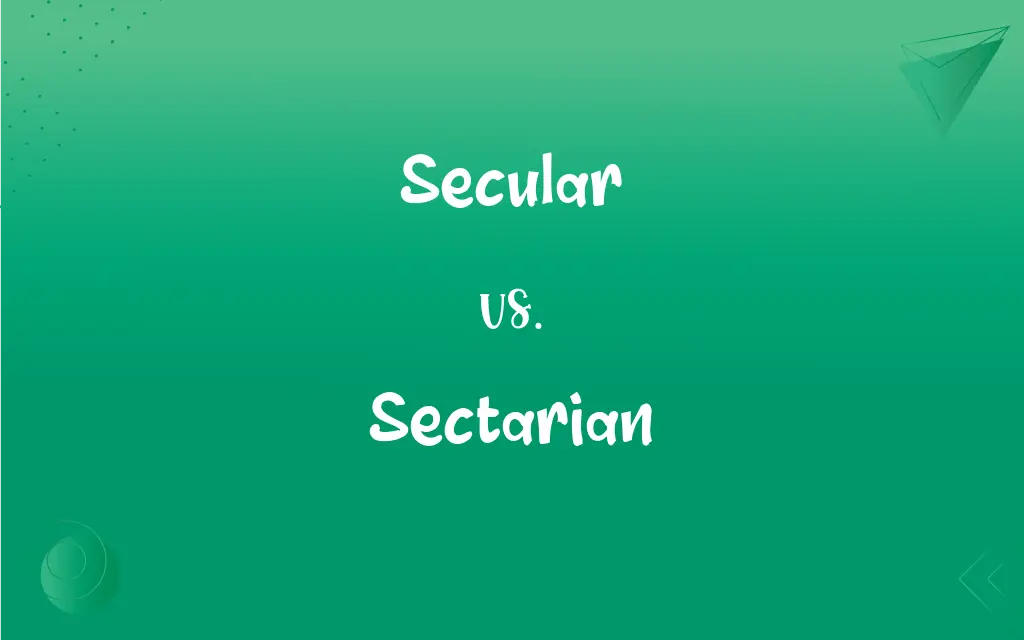Secular vs. Sectarian: What's the Difference?
Edited by Janet White || By Harlon Moss || Published on December 4, 2023
Secular refers to things unrelated to religion, while sectarian pertains to religious factions or divisions.

Key Differences
Secular relates to aspects outside the realm of religion, focusing on worldly rather than spiritual matters. In contrast, sectarian refers to divisions within or between religious groups, often highlighting differences in beliefs.
The secular approach is often seen in government policies that separate state affairs from religious influences. Sectarian, on the other hand, is used to describe conflicts or biases rooted in religious distinctions.
In education, a secular curriculum avoids religious teachings, emphasizing a neutral or non-religious perspective. Sectarian education, conversely, is aligned with specific religious doctrines and often teaches from that perspective.
Secular organizations operate independently of religious institutions, focusing on broader societal issues. Sectarian groups are affiliated with or support particular religious sects, often prioritizing their religious identity.
Secular values emphasize universal principles applicable to all, regardless of religious affiliation. Sectarian values, however, are closely tied to the beliefs and practices of specific religious groups.
ADVERTISEMENT
Comparison Chart
Definition
Unrelated to religious matters.
Related to religious factions.
Usage in Society
Inclusive of all, regardless of faith.
Often exclusive to a religious group.
Government Policy
Separation from religious influence.
Policies influenced by a religion.
Educational Approach
Neutral towards all religions.
Aligned with specific religious teachings.
Influence on Social Issues
Focuses on non-religious solutions.
Solutions may be guided by religious views.
ADVERTISEMENT
Secular and Sectarian Definitions
Secular
Secular involves a focus on worldly rather than spiritual matters.
Secular ethics are based on societal values, not religious ones.
Sectarian
Sectarian is used to describe events or issues involving religious factions.
The peace talks aimed to address sectarian violence.
Secular
Secular can describe institutions not affiliated with a church or religion.
The secular charity welcomes volunteers from all faiths.
Sectarian
Sectarian describes actions or attitudes biased towards a specific sect.
Sectarian policies often lead to social exclusion.
Secular
Secular refers to being independent of religious affiliations.
The government adopted a secular approach to education.
Sectarian
Sectarian can refer to strong allegiance to a particular religious faction.
The leader's sectarian views influenced his decisions.
Secular
Secular denotes activities or attitudes not bound by religious rules.
Secular music often explores themes beyond religious contexts.
Sectarian
Sectarian relates to divisions within or between religious groups.
The sectarian conflict was rooted in historical religious differences.
Secular
Secular is often used to describe neutrality in matters of religion.
They preferred secular celebrations to religious festivals.
Sectarian
Sectarian encompasses the qualities or characteristics of religious sects.
The community was known for its sectarian harmony.
Secular
Worldly rather than spiritual
The secular affairs of the parish.
Sectarian
Of, relating to, or characteristic of a sect.
Secular
Not relating to religion or to a religious body; nonreligious
Secular music.
Sectarian
Adhering or confined to the dogmatic limits of a sect or denomination; partisan.
FAQs
What does secular mean?
It means unrelated to religious matters.
Does secular mean anti-religious?
No, it means neutral towards religion.
Does sectarian imply intolerance?
It can, especially in contexts of bias or division.
Can a government be secular?
Yes, when it operates independently of religious institutions.
What is a sectarian conflict?
A conflict based on religious differences.
Can an organization be sectarian?
Yes, if it aligns with specific religious sects.
What is a secular lifestyle?
A lifestyle not governed by religious rules.
What are secular values?
Values based on non-religious principles.
Is secularism growing globally?
There is a trend towards secularism in many societies.
What does sectarian mean?
Relating to religious factions or divisions.
Are secular laws based on religion?
No, they are independent of religious doctrines.
Why is sectarianism seen negatively?
Because it often leads to division and conflict.
Do secular societies respect religious freedom?
Yes, secularism often includes the principle of religious freedom.
Can sectarian views change over time?
Yes, they can evolve with societal and cultural shifts.
Can a person be secular and religious?
Yes, one can practice a religion personally but support secularism in public life.
Can a secular state have a state religion?
Typically, a secular state does not endorse a state religion.
How do sects differ from denominations?
Sects are often smaller and may have more distinct beliefs.
What's the difference between secular and atheist?
Secularism is about separation from religion, while atheism is disbelief in deities.
Can education be secular?
Yes, when it is neutral regarding religion.
Is sectarianism only a religious issue?
Primarily, though it can influence cultural and political aspects.
About Author
Written by
Harlon MossHarlon is a seasoned quality moderator and accomplished content writer for Difference Wiki. An alumnus of the prestigious University of California, he earned his degree in Computer Science. Leveraging his academic background, Harlon brings a meticulous and informed perspective to his work, ensuring content accuracy and excellence.
Edited by
Janet WhiteJanet White has been an esteemed writer and blogger for Difference Wiki. Holding a Master's degree in Science and Medical Journalism from the prestigious Boston University, she has consistently demonstrated her expertise and passion for her field. When she's not immersed in her work, Janet relishes her time exercising, delving into a good book, and cherishing moments with friends and family.







































































